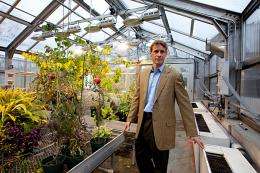Time to change the menu

With global population expected to increase by about 2.5 billion by 2050 even while climate change hits farmlands with shifting rainfall and temperatures, it may be time to rethink what we eat and how we produce food, according to a Harvard Medical School instructor and authority on environmental change and human health.
Samuel Myers, instructor in medicine at Harvard Medical School (HMS), laid out evidence that the global food supply system is already showing cracks. Add those people and throw in the effects of climate change and — although it’s not time to panic — it may be time to be concerned, Myers said.
Myers, who spoke as part of the Harvard Museum of Natural History’s “Food for Thought” lecture series Tuesday (Feb. 23), said that the 20th century’s “green revolution” in agriculture made use of new farming techniques, chemical fertilizers and pesticides, and new crop strains to increase the global food supply dramatically and make a liar out of Thomas Malthus, who famously predicted that population growth would outstrip the expanding food supply.
Myers pointed out, however, that even one of the fathers of the green revolution, Norman Borlaug, who won the 1970 Nobel Peace Prize for his efforts, said burgeoning agriculture would buy only a few decades of food security against continued population growth.
In recent years, humans have appropriated more land and water to feed themselves, until now between a third and a half of all ecosystem yield is used for human food production. Humans use roughly half of all ice-free, non-desert land and half of accessible fresh water, much of that for agriculture.
Despite that massive use of the Earth’s resources, humanity still fails to feed itself adequately. The inequities in the global food network hit a dubious milestone last year, authorities say, for the first time passing the mark of 1 billion people who go to bed hungry nightly.
Even before population growth and climate change are considered, the current agricultural system is already under siege, Myers said. Much arable land is lost each year to erosion, salinization, and desertification. Fresh water is increasingly drawn from nonrenewable sources, such as melting glaciers and slowly draining subterranean aquifers. Three hundred million Chinese and Indians are living on what Myers termed “fossil water,” deposited underground in the ancient past. One estimate suggests that 3 billion people will live amid water scarcity by 2025.
“We are already coming against very sharp constraints in the use of water,” Myers said.
Other concerns include agricultural pollution, fisheries depletion (fish catches peaked in the 1980s), and biodiversity loss, Myers said.
With a global population surge, the spread of Western-style diets, and the rise of an international middle class demanding higher-quality foods, Myers said that growers may need to double global food production by 2050 to meet demand. That would require a tripling of water for irrigation using current methods, something that Myers said was impossible.
While the effects of climate shifts are uncertain, some — such as changing rainfall patterns, snowpack timing, and glacier melt — could hurt agriculture. In addition, Myers said, recent research has shown that plant production can decline when temperatures increase, leading to less-efficient food production at a time when more is needed. The 2003 European heat wave, for example, did more than kill many people. It cut agricultural yield by 20 to 36 percent.
Despite the gloomy outlook, however, Myers said he is optimistic that such challenges will yet be solved. New technologies, plant breeds, and agricultural techniques can be devised to conserve water and boost productivity. And even as we rethink how our food is produced, we may also need to rethink what it is that we eat. Either way, he said, it’s important to get the conversation started now.
Provided by Harvard University















